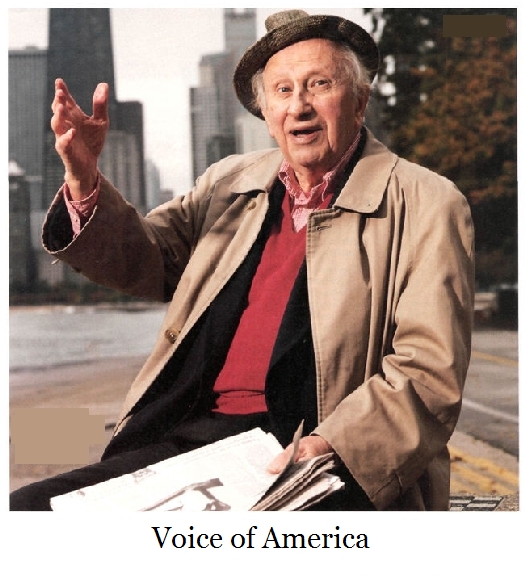
Studs Terkel died today at the age of 96, and though you likely have to be from Chicago as I am fully to appreciate the import of that loss, everyone who loves folk music and a good read and oral history and the United States of America should take some note of his passing.
I'm betting that the obituaries will focus on Terkel's really marvelous series of oral histories, most of which reached best seller status and whose titles are likely familiar to many who read here : Hard Times with ordinary people telling of their memories of the Great Depression at a remove of forty years; Working , in which ordinary people talk about the jobs they do and how they feel about those occupations; and maybe the best known, The Good War , in which ordinary people (sensing a trend here, are we?) recalled their parts in World War II , written in the 80s long before "the greatest generation" commotion began to surface and when Terkel's interviewees were still vigorous and about the age that most of us here are now - with a developed sense not only of what they did and what they lost but how it colored and shaped the rest of their lives.
But Terkel was much more than a writer with an innate sense of the stories that needed to be told and an interviewing genius that enabled him to elicit the most intimate, profound, and frequently moving revelations from his subjects (and Terkel rarely put himself into his narratives at all). He was an activist, a blacklistee, a bit of a poet, founder of the Old Town School of Folk Music with Win Stracke and Frank Hamilton (later of the Weavers) that produced luminaries like Bob Gibson and Jim (Roger) McGuinn - and the host of an incredibly interesting radio show in Chicago for well over forty years. Though the show was eponymous, it was promoted by Chicago's WFMT-FM radio station for all the years of the folk revival as "The Midnight Special" (though memory tells me it started at 11 pm).
Terkel loved all kinds of music and played them all - experimental jazz, blues, occasional show tunes, and anything that could be called folk. Though he favored populist/leftist and traditional singers - no surprise there - he also enjoyed pop folk and played the KT, the Clancys, and the Chad Mitchell Trio frequently. It was on Terkel's show that I first heard many of the old folk performers I'd only read about on album covers or in articles, Leadbelly, Big Bill Broonzy, Sonny Terry, Cisco Houston - all of whose records I subsequently bought and enjoyed because of Studs Terkel.
When I heard that he died this afternoon, I changed my plan for Weekend Videos and recalled that Terkel often opened and closed his show with this recording of Leadbelly doing "Midnight Special" - this very recording:
You can't compete with the original cats, as Dave Guard said of Hawaiian musicians on Live At Newport - but NBJ gave them a run for the money with the raw, uptempo energy of their performance of the song from the first Decca album - a performance that deserved a much better production and mixing than it got (can we spell V-O-Y-L-E-G-I-L-M-O-R-E?):
As I'm sure most here know, the song is a chain gang/jailhouse song from the penitentiaries of the Deep South at the turn of the last century, most especially from the work farms of Louisiana and Texas that gave birth to many great songs like "Old Riley" and "Ain't No More Cane On This Brazos." According to the legend most closely associated with the song, some prisoners believed they would be able to escape their (usually) life sentences if they could scratch their way up the high walls of their cells to the barred windows to catch the beams of the headlight of the passing train, whose lonely whistle fading into the night must have been a wrenching reminder of the freedom that they had lost, given away - or been robbed of.
I think you can hear all that and more from Odetta, who blessedly is still with us:
The first notes you hear on the next version are a then- unknown Bob Dylan playing mouth harp to introduce Harry Belafonte's bluesed-out and typically intense version. Reminds you of what a great singer Belafonte is.
Speaking of being blessed with the ongoing presence of a legend - here is Pete Seeger and his grandson Tao doing the song in January of this year when Pete was only 88. See my comment about Belafonte:
Even a good song can be done badly and a good group overreach itself. Here's a bad 70s flashback of ABBA trying their hand at the number.....
...and finally, a good 70s flashback which, if not exactly folk, deserves to close the show - John Fogerty and Creedence Clearwater Revival:
Always one of my favorite songs - and one I wish the KT had used as a show opener more often than they did.
Additions At 3.5 Years +
The huge catalog of folk songs on YT has grown exponentially since this post first appeared in 10/2008. Among the best and most classic performances of this song - The Weavers from around 1950:
...and Paul McCartney from 1991, reflecting his early roots in R&B and skiffle:


No comments:
Post a Comment